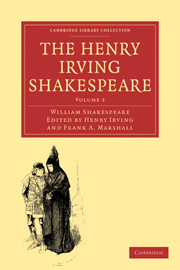PREFATORY NOTE
Published online by Cambridge University Press: 29 August 2010
Summary
The plays in this volume, with the exception of Richard III., belong to what is generally called Shakespeare's Second Period. In King John we find a great advance in characterization; in the Merchant of Venice we have the first of Shakespeare's best comedies; and in the two parts of Henry IV. Shakespeare reaches the climax of excellence in his historic plays. The first play in this volume, Richard III., occupies a disproportionate space owing to the immense number of differences between the Quarto and Folio readings, and to the difficulty of deciding, in many instances, between these two authorities on the text.
In this volume the plan of co-operation, as far as the editing is concerned, has been put to a practical test. The difficulty of securing uniformity in the plan of the work has been considerable in the case of plays edited at a distance—the two last plays having been chiefly edited in America. But I hope that the object which we set before us in commencing this edition has been attained, namely, while preserving all the characteristic features of the edition, to allow the co-editors of the various plays perfect liberty of opinion.
I have again to thank many kind friends for their valuable help; and I trust that the very moderate amount of fault-finding, in which some of the critics and private individuals have indulged, will not be found to have been wasted. Some slips have been made in spite of all the care that has been exercised; but I defer giving a list of errata till the work is farther advanced.
- Type
- Chapter
- Information
- The Henry Irving Shakespeare , pp. v - viPublisher: Cambridge University PressPrint publication year: 2009First published in: 1888

